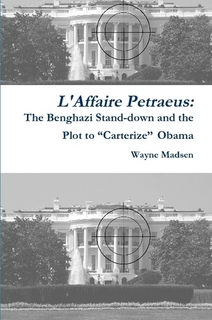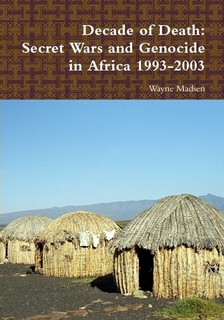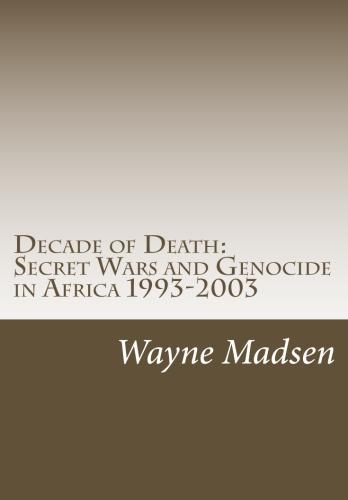November 30 - December 1, 2016 -- Were U.S. troops aware of massacre of civilians in Uganda?
WMR's sources in Africa have provided us with shocking and gruesome photographs claimed by Ugandan human rights personnel to be the aftermaths of Ugandan armed forces raids on villages of Bakonzo tribal people along the Ugandan border with the Democratic Republic of Congo. On November 26, units of the Ugandan People's Defense Force (UPDF) and the national police swept through Kasese Town in Uganda's mountainous Ruwenzori district to disarm royal guards protecting the Bakonzo king, Charles Wesley Mumbere. Ever since Ugandan independence in 1962, the Bakonzo have striven to become an independent nation straddling the Ugandan-DRC border. The DRC state of North Kivu is actually where most Bakonzo live but their limited-autonomy kingdom in Uganda was formally recognized in 2009 by Uganda's dictator and U.S. military ally, Yoweri Museveni.
Recently, Bakonzo separatists declared the "Republic of Yiira." Museveni claims the Ugandan forces were sent into the border region to quell the separatist movement and arrest the Bakonzo king for leading it. However, a spokesman for the king denied that the monarchy and armed royal guards were behind the Yiira Republic. Nevertheless, the UPDF and police forcibly disarmed the royal guard force and arrested the king, who was flown to the capital of Kampala. There are unconfirmed reports that Museveni ordered the king executed after he was charged with murdering a policeman in March of this year. A Ugandan female journalist covering the military action in Ruwenzori for Kenyan television has also disappeared. In early 2016, Museveni declared: "I want to state categorically that Uganda will not lose even a piece of her land to the creation of the so-called Yiira republic."
King Charles left Uganda for the United States in 1984 on a college scholarship. After his father led a secessionist group upon independence in 1962, the Ugandan government brokered a peace agreement with Charles's father, King Kibanzanga. The Bakonzo were given limited autonomy and Charles, who worked as a nursing assistant in elder care homes in Pennsylvania and Maryland, became the Bakonzo king after the death of his father. Maryland sources in the Ugandan diaspora community told WMR that while living in Langley Park, Maryland, Charles hung out with teenage African-American girls, drank heavily, and "smoked weed." These Ugandan expatriates, many of whom oppose Museveni's rule, suggest that King Charles is not an entirely sympathetic figure. However, they add Charles's troubled past in the United States does not change the fact that his people are being massacred by Ugandan forces.
Muberere allowed Charles to be crowned king of the Ruwenzori Kingdom in 2009 in return for allegiance to Museveni's government and limiting Bakonzo autonomy to merely cultural and social matters. Ruwenzori has been a hotbed of anti-Mueseveni political activity and in the last presidential election, Museveni, who has ruled Uganda since 1986 with an iron grip, saw a majority of the Bakonzo people vote against him.
Museveni decided to split the Ruwenzori Kingdom into two parts as punishment for their lack of support. It was that threat, as well as land disputes with the government stemming from the presence of diamonds, gold, and rare-earth minerals in the region, that triggered the separatist movement. Museveni and his family are known to personally profit from the mining of precious metals and rare-earth minerals in the country.
The Ugandan police claims that some 54 people, 41 royal guard "rebels" and 13 Ugandan policemen, were killed in the weekend Ugandan "invasion" of Ruwenzori, but Ugandan opposition sources claims the death toll was much higher and consisted largely of Bakonzo civilians, including at least 23 children. UPDF personnel also stripped naked all the female employees of the royal palace and took them away to an unknown location.
Ugandan opposition sources are also questioning what role U.S. military units stationed in Uganda, including a Special Forces detachment, played in the massacres in Ruwenzori and Kasese Town. Museveni, in a show of support for the American "global war on terrorism," granted the U.S. military base rights at Entebbe Airport and Kitgum Airport. The U.S. has based CV-22 Osprey and refueling and surveillance aircraft, including drones, at Entebbe.
Uganda has also served as a staging point for U.S. Special Forces sorties into the neighboring DRC, Central African Republic, and South Sudan in pursuit of Lord's Resistance Army guerrillas and their warlord leader Joseph Kony. The UPDF Special Forces Command, which reportedly took part in the invasion of Ruwenzori and the massacre of civilians, was trained by U.S. Navy SEALS at the the Camp Kasenyi Special Forces School near Entebbe.

U.S. Special Forces and their Ugandan counterparts in 2011 in Camp Kasenyi, Uganda
If U.S. forces participated in the massacre of the Bakonzo people it would not be the first time. American Special Forces troops sent into the Central African Republic from Uganda to arrest or kill Kony cooperated with Muslim guerrillas, called Seleka, who had overthrown the central government in Bangui in 2012 and committed mass murder and rape of Christian villages in the country. This alliance between U.S Special Forces and a Muslim terrorist guerrilla force was authorized by President Obama and his national security adviser Susan Rice. It also happens that Rice is a close personal friend of Museveni.
WMR has placed photographs received of the massacre of civilians by Ugandan troops behind a hotlink. Caution: these photos are grisly and shocking.
Under Obama, U.S. military forces, assigned to the U.S. Africa Command (AFRICOM) and U.S. Special Operations Command Africa (SOCAFRICA), have taken part in various campaigns to put down secessionist rebellions throughout Africa. In addition to the recent campaign against the Republic of Yiira, U.S. forces have assisted national armies in operations against separatists in the Niger Delta and Biafra in Nigeria, the Tuareg self-declared republic of Azawad in northern Mali, the Cabinda exclave of Angola, Oromia in Ethiopia, Casamance in Senegal, the Caprivi Strip in Namibia, Barotseland in Zambia, Western Sahara (occupied by Morocco), and Mombasa in Kenya.

In what could further disgrace the Africa record of Obama, America's first African-American president, is the possibility that U.S. troops advised their Ugandan counterparts in carrying out one of the worst recent genocides on the African continent.














